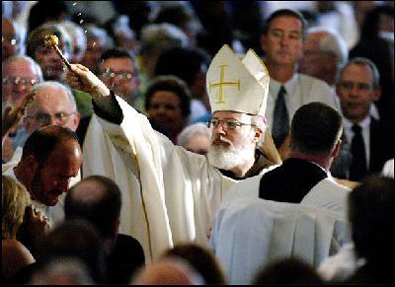Speaker of the House Nancy Pelosi, interviewed on August 24 on Meet the Press made reference to the traditional Catholic teaching that in pregnancy, personal life does not begin until later in the pregnancy when the fetus is “formed.” St. Thomas Aquinas, the greatest of Catholic theologians put that at three or four months; for centuries it was put at “quickening”; with modern scientific knowledge of brain development Catholic scholars today put that at six or seven months. Many Jewish scholars grant personal status only at the time of birthing. World religions generally do not hold that the early fetus has the moral status of a person. Fierce denunciation fell upon the head of Ms. Pelosi, not from the societies of Catholic theologians who know better, but from bishops and cardinals.
Bishops are many things. They are pastors and administrators and fund raisers. They are businessmen who handle extensive tax-exempt property holdings. They are very active lobbyists. They are not professional theologians though they often play one on TV or in the press. They go before cameras to give their amateur theology as though it were the one and only true “Catholic teaching.” Complex and debatable issues are treated simplistically in ways that insult the subtleties of the Catholic moral tradition and the rich moral traditions of all the world’s religions. The bishops focus mainly on what I call the “pelvic issues.” These they call “intrinsic evils” — artificial contraception, same sex unions, and abortion. These issues are freely discussed by theologians in all the world’s religious traditions. There is no infallibly defined position on any of these issues, nor could there be.
Some of the bishops take their oversimplified theology into the political arena and publicly (from their tax-exempt properties) try to bar Catholic legislators from the sacraments if they do not adopt the bishops’ point of view. Catholic legislators are attacked if they believe that pregnant women, not the government, are best suited to make decisions on their pregnancies. No such sanctions are invoked against legislators who voted to attack Iraq even though modern war is abortifacient. Ninety percent of the casualties in modern war are civilians, many of them children and many of them pregnant women. Those who vote for that are still welcome at the communion rail.
Saints Thomas Aquinas and Augustine both held that a Catholic legislator could vote to legalize prostitution if they foresaw greater evils coming from banning it. Augustine said, and Aquinas agreed, that if this outlet for aberrant sexual energy were closed, greater evils could ensue. Thus, they said, the good legislator should imitate God who permits some evils lest worse evils result. Today a Catholic legislator who thinks all abortions are evil could still vote to sustain its legality since banning legal abortion leads to illegal abortions with a high loss of life, especially for poor women. History proves that criminalizing abortion does not decrease the number of abortion but does increase morbidity and mortality.
The bishops love the term “intrinsic evil,” which they reserve for the pelvic issues. “Intrinsic evil” is a term from Catholic moral theology that has fallen into disuse in favor of the Thomistic insight that “human actions are good or evil according to their circumstances.” Certain actions, referred to as “negative moral absolutes” (such as rape or nuclear war) are judged as always wrong, not “regardless of their circumstances” but precisely because of their circumstances. There is no circumstance imaginable where such actions could cause more good than harm and thus be in Thomas’ sense “reasonable,” (secundum rationem, rationabile).
Artificial contraception would not qualify as a negative moral absolute. Indeed, contrary to Vatican theology, the failure to use condoms when one’s spouse is HIV positive is morally wrong. There are many other circumstances where the failure to use artificial contraception could not be morally justified.
Abortion is also not seen by Catholic theologians as “intrinsically evil.” The following are cases from real life. Few theologians and few others would accuse these women of sin.
Case #1: A woman is happily pregnant, two months pregnant. She is diagnosed with cancer requiring immediate chemotherapy which also attacks the fetus. She aborts.
Case #2: In spite of her best contraceptive efforts a woman gets pregnant. She has a heart condition which would put her at high risk of dying if she stayed pregnant. She aborts.
Case #3: A young woman is manic depressive and her psychotic condition is managed by lithium. She becomes pregnant in spite of her best efforts. She is told that lithium could devastate the cardiovascular system of the fetus and probably already has. She aborts.
Case #4: Rosita, a nine-year-old Nicaraguan girl is raped and impregnated. She cannot bear a child at her age without disastrous effects on her body as well as on her mind. When it became evident she would not live to deliver if the pregnancy went to term, an abortion was arranged and done over the objections of the Nicaraguan Catholic hierarchy.
Case #5: A case was once brought to the attention of Fr. Bernard Haring, the distinguished Redemptorist Moral Theologian. After removing a tumor from the uterus of a pregnant woman, a surgeon in Germany could not stop the bleeding. He removed the non-viable fetus so that the uterus would contract. It did and the woman survived because a Catholic surgeon had performed a direct abortion. A priest told the surgeon he had acted wrongly. The surgeon appealed to Fr. Haring. Fr. Haring disagreed, saying the surgeon acted morally and properly. He had saved as much life as was possible. Fr. Haring asked: by what thinking could the fetus have such a right to life that it could kill both itself and the woman by exercising it? Such rights, he said, do not exist.
Before bishops speak publicly on abortion, they should kneel and say a prayer to their saintly predecessor, St. Antoninus, Archbishop of Florence and a renowned theologian, whose feast day is May 10. He approved early abortions when needed to save the woman’s life, a frequent case in his day.
Same sex unions are also not seen in Catholic theology as “intrinsically evil.” Marriage is not an award for being heterosexual. The need for loving, faithful-until-death unions is not heterosexual-specific. It’s a human good for everyone.
So What About These Bishops?
The Second Vatican Council wisely said: “Let the layman not imagine that his pastors are always such experts, that to every problem which arises, however complicated, they can readily give him a concrete solution, or even that such is their mission (The Church in the Modern World, n. 43). The laity, “anointed as [the laity] are by the holy One” (Constitution on the Church, n. 12) and experienced as they are in their grace-filled lives have their own moral authority. It has a solid place in traditional Catholic theology and it is often called the sensus fidelium, the experience-fed wisdom of the faithful.
Bishops would be well advised to show more intellectual modesty and to acknowledge, with the previous code of Canon Law, that “the bishops, whether teaching individually or gathered in particular councils, are not endowed with infallibility” (Canon 1326).
Cardinal Dulles made a crucial theological point in his Presidential address to The Catholic Theological Society of America. He said that the Second Vatican Council “implicitly taught the legitimacy and even the value of dissent” (“Presidential Address: The Theologian and the Magisterium,” Proceedings of the Catholic Theological Society of America 31 [1976]). You can disagree with the bishops and still be a good Catholic, according to Cardinal Dulles.
These are not the words of some fringe theologian; these are the words of a theologian who is now a cardinal of the Catholic Church and nothing in his subsequent writings refutes these basic and broadly accepted assertions.
During the Vietnam war, the United States bishops issued instructions to “the faithful.” The bishops said that they thought that war to be just…a judgment very few support today. However, they said that the war was a complicated matter and they urged Catholic to pray and consult and decide for themselves. That’s the kind of good sense and humility the bishops need today. They should stop persecuting Catholic legislators and pontificating on issues where they have no privileged expertise.





